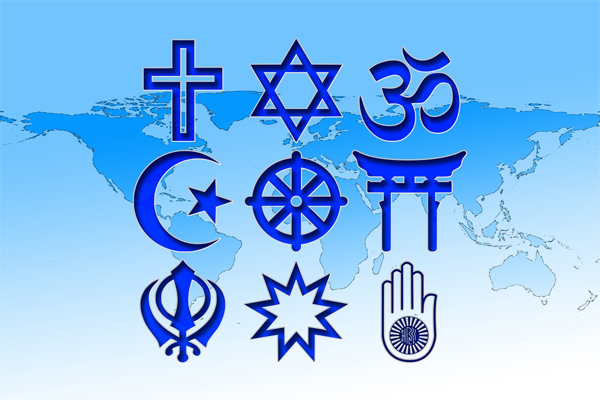Despite well-intentioned efforts to embrace diversity and inclusion, a new study has described UK workplaces as ‘hostile environments’ for people of religious faiths.
The research, carried out by business psychology consultancy Pearn Kandola to understand the experiences of 6,315 workers of different religious faiths at work, uncovered that discrimination against religious employees is rife in most workplaces. The report, which included Buddhist, Christian, Hindu, Jewish, Muslim and Sikh employees, found that nearly half (47%) of workers belonging to a faith did not feel comfortable discussing the religious festivals they celebrate at work.
Of the 3,433 respondents who wore religious dress or symbols, almost two-thirds (64%) were not comfortable wearing them in the workplace. Additionally, nearly four in 10 (38%) said their organisation could do more to be more inclusive of people of different faiths.
RELIGIOUS HOLIDAY REQUESTS
When it came to allowing people time off to celebrate religious holidays or festivals, nearly one in five (19%) said they had a request to take annual leave for it rejected. Worryingly, when employees expressed their religious identity at work, nearly a third (32%) had a negative experience. This included being the subject of mockery, exclusion, mistreatment, isolation, stereotyping and discrimination.
There were also stark differences in the way that people of different faiths found requests for annual leave treated. More than two thirds (69%) of Christian respondents were more likely to find employers happy to allow annual leave requests for holy days. However, only one quarter (25%) of Hindu respondents had the same experience.
Nearly a third of Muslim respondents (31%) had felt requests for time off for religious holidays and festivals were rejected without good business reason; an experience shared by a quarter (25%) of Sikhs, 23% of Hindus, one in five (20%) Jews, 14% of Buddhists and only 2% of Christians.
RELIGIOUS DISCRIMINATION AT WORK
The research also sheds light on the reality of tolerance and diversity for millions of people of faith in the UK, thanks to an additional national poll carried out by Pearn Kandola of 2,000+ British people, to understand perceptions around religion, society and work. It found that nearly one in five (19%) people had witnessed someone being judged because of their religious beliefs in the workplace.
The most common type of discrimination witnessed was religious colleagues being the butt of jokes (32%); being isolated or excluded from activities (23%); denied annual leave for religious festivals (22%); being told not to wear religious clothing (22%); mocked for the food they eat (20%); or being asked to remove religious symbols (19%).
Top Five Forms of Discrimination Witnessed in the Workplace:
- Jokes because of their religion 31%
- Isolated or excluded from activities 23%
- Denied religious festivals as annual leave 22%
- Told not to wear religious clothing at work 22%
- Mocked for the food they eat 20%
GENERATIONAL DIVIDE ON RELIGION AT WORK
The research also uncovered a large divide in experience across age groups, with a quarter (25%) of workers under the age of 55 revealing they had witnessed religious discrimination, compared to just one in 10 (9%) over 55s. While the public was relatively evenly split when asked if it is appropriate to express religious beliefs in the workplace – 43% said ‘it was’ compared to 41% who said ‘it wasn’t’. This was far more obvious in those aged 55+, with 53% saying that the expression of religious views at work was inappropriate, compared to a third (33%) of under 55s.
“We see a significant generational divide when it comes to perception of these issues,” noted Professor Binna Kandola OBE, diversity and inclusion specialist from Pearn Kandola, and author of the research. “These different cultural approaches can leave organisations disjointed and fractured as senior leaders take views which are at odds with colleagues. It’s important to recognise these differences and ensure one point of view doesn’t dominate.”
WORK & FAITH
The research also painted a varied and polarised picture of attitudes towards faith and work, with nearly half of respondents (46%) saying it was nice to have colleagues with diverse religious beliefs, and two in five said people should be allowed to express their religious beliefs at work through what they wear, including symbols and clothing.
But this was in stark contrast to almost a third of people (31%) who thought religious dress which masked someone’s identity should be banned in public. The study also highlighted that many people in Britain are divided about how businesses and organisations should mark religious festivals and holy days, with a third (33%) saying it is too disruptive for everyone to take their religious festivals as days off. However, slightly more than a third (35%) believe employees of all faiths should be entitled to take their religious holidays as days off. A significant 38% said they thought it was disrespectful when businesses called Christmas or Easter the holiday or festive season.
CREATING INCLUSIVE ENVIRONMENTS FOR PEOPLE OF FAITH
“It’s extremely disappointing to find that people of all faiths are likely to experience discrimination or have a negative experience at work,” stated Professor Kandola. “While organisations realise the benefits of developing diversity and inclusion strategies, many seem to be falling short when it comes to creating an open and inclusive environment for people of faith.”
Like most D&I experts, Kandola believes that businesses are not getting the best from their employees when they feel the need to conceal important parts of their life, such as religious beliefs. “We hope the findings of this major report will be a wake-up call and prove a catalyst for organisations to takes steps to improve the experience of people of faith,” he concluded.
Click here to download a copy of the report.







































